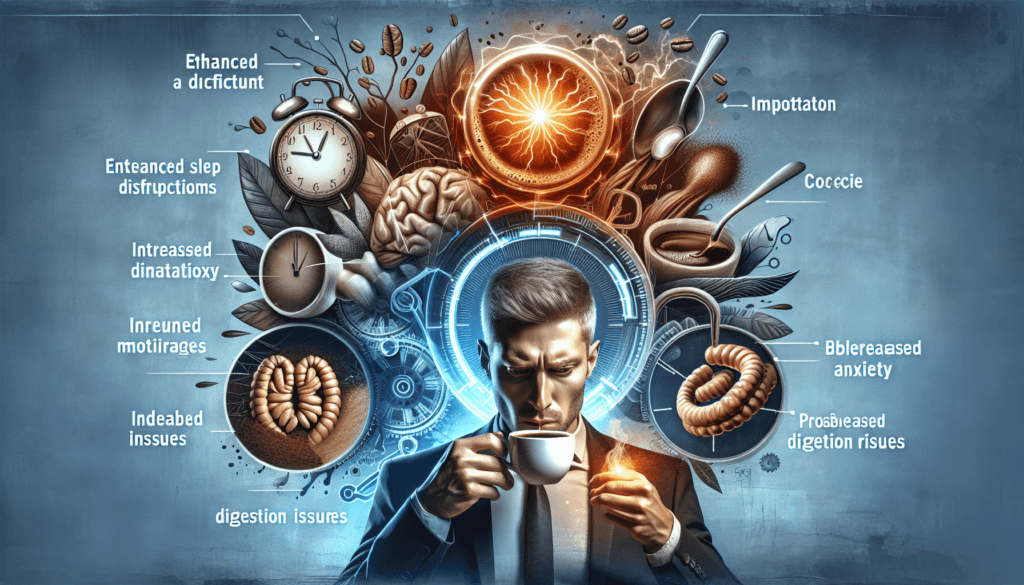You love starting your mornings with a warm cup of coffee, savoring the rich aroma and the gentle jolt of caffeine. But have you ever wondered if it’s bad to have a coffee every day? You may have heard mixed opinions about the effects of daily coffee consumption on your health. In this article, we’ll explore the potential pros and cons of indulging in this beloved beverage on a daily basis. So, grab your favorite mug and join us on this caffeine-filled adventure to discover the truth behind your daily cup of joe.

Potential Health Benefits of Daily Coffee Consumption
Reduced risk of developing type 2 diabetes
Drinking coffee on a daily basis has been found to significantly reduce the risk of developing type 2 diabetes. Numerous studies have shown that coffee consumption can improve insulin sensitivity and regulate blood sugar levels, which are key factors in preventing diabetes. Research suggests that each additional cup of coffee per day can lower the risk by up to 7%. However, it is important to note that this benefit tends to be more pronounced with regular coffee consumption rather than occasional indulgence.
Protective effect against liver diseases
The liver is a vital organ responsible for various metabolic processes in the body. Coffee has been found to have a protective effect against liver diseases such as cirrhosis, non-alcoholic fatty liver disease, and liver cancer. The antioxidants and bioactive compounds in coffee can help reduce inflammation and prevent liver damage caused by harmful substances like alcohol and fatty deposits. Regular coffee drinkers have shown a decreased risk of liver diseases, with some studies reporting up to an 84% lower risk of liver cirrhosis among individuals who consume four or more cups of coffee per day.
Improved cognitive function and mental performance
Coffee is often associated with increased alertness and improved cognitive function. The caffeine in coffee stimulates the central nervous system, enhancing focus, attention, and overall mental performance. Studies have shown that coffee consumption can improve memory, reaction time, attention span, and even mood. Regular coffee drinkers may have a reduced risk of developing neurodegenerative diseases, such as Alzheimer’s and Parkinson’s, as coffee has been found to have neuroprotective properties.
Lower risk of certain types of cancer
Coffee consumption has been linked to a decreased risk of certain types of cancer. Studies suggest that coffee drinkers have a lower risk of developing liver, colorectal, endometrial, and certain types of breast cancer. The antioxidants and anti-inflammatory compounds in coffee may help inhibit the growth of cancer cells and prevent DNA damage. However, it is important to note that individual factors, such as genetics and lifestyle, also play a role in cancer development, and coffee should not be considered a sole preventive measure.
Enhanced physical performance
For those who engage in regular physical activity, coffee can be a beneficial addition to their routine. The caffeine in coffee is a natural stimulant that can improve physical performance by increasing adrenaline levels, mobilizing fatty acids, and enhancing muscle contraction. Studies have shown that coffee consumption before exercise can lead to increased endurance, reduced perceived effort, and improved overall performance. However, it is essential to listen to your body and avoid excessive caffeine consumption, which can have negative effects on the cardiovascular system.
Negative Effects of Daily Coffee Consumption
Negative impact on sleep quality
One of the most well-known negative effects of daily coffee consumption is its impact on sleep quality. The stimulating effects of caffeine can interfere with the body’s natural sleep-wake cycle. Consuming coffee too close to bedtime can delay the onset of sleep, decrease total sleep time, and disrupt the overall quality of sleep. This can lead to feelings of fatigue, daytime sleepiness, and impaired cognitive functioning. It is advisable to limit coffee consumption in the late afternoon and evening hours to ensure a good night’s rest.
Increased risk of cardiovascular issues
While moderate coffee consumption generally does not pose significant risks to cardiovascular health, excessive consumption can increase the risk of certain cardiovascular issues. High levels of caffeine intake can temporarily raise blood pressure and heart rate, leading to a higher risk of heart palpitations, arrhythmia, and cardiovascular events in vulnerable individuals. It is important to be mindful of individual sensitivity to caffeine and consider limiting consumption if experiencing any adverse cardiovascular symptoms.
Potential for addiction and withdrawal symptoms
Coffee contains caffeine, a mildly addictive substance that can lead to dependence and withdrawal symptoms when consumption is abruptly stopped. Regular coffee drinkers may experience symptoms such as headaches, fatigue, irritability, and difficulty concentrating when attempting to quit or reduce their intake. It is important to gradually reduce coffee consumption if wanting to reduce dependence or seek professional guidance if experiencing withdrawal symptoms.
Possible negative effect on pregnancy and fertility
High levels of caffeine intake have been associated with adverse effects on pregnancy and fertility. Research suggests that excessive caffeine consumption during pregnancy may increase the risk of miscarriage, preterm birth, low birth weight, and developmental issues in the baby. It is recommended for pregnant individuals to limit their caffeine intake to 200mg per day, which is equivalent to about one 12-ounce cup of coffee.
Potential for increased anxiety and irritability
Coffee consumption can sometimes exacerbate symptoms of anxiety and irritability, especially in individuals prone to these conditions. The stimulant effects of caffeine can trigger or worsen feelings of restlessness, nervousness, and racing thoughts. It is important to be mindful of individual reactions to coffee and consider reducing consumption or opting for decaffeinated alternatives if experiencing heightened anxiety or irritability.

Moderation and Balance
The importance of consuming coffee in moderation
While coffee can offer potential health benefits, it is important to consume it in moderation. Each individual has their own tolerance to caffeine, and excessive consumption can lead to adverse effects. It is generally recommended to limit coffee intake to 3-4 cups per day, which provides a balance between reaping the benefits and minimizing the risks associated with caffeine consumption.
Individual sensitivity to caffeine levels
Understanding your own sensitivity to caffeine is crucial in determining optimal coffee consumption. Some individuals may be more sensitive to the effects of caffeine, experiencing jitters, increased heart rate, or digestive discomfort with even small amounts. Others may tolerate caffeine well and require larger amounts to experience the desired effects. Listening to your body and adjusting your consumption accordingly is key to maintaining a healthy balance.
Balancing coffee intake with a healthy lifestyle
Coffee should not be viewed as a standalone health solution but rather as part of an overall healthy lifestyle. It is important to emphasize a well-rounded diet, regular physical activity, sufficient sleep, and stress management alongside coffee consumption. Incorporating nutrient-rich foods and staying hydrated are also essential for optimal health. Remember that coffee is just one piece of the puzzle and should not be relied upon as a sole source of nutrition or energy.
Considering personal health conditions and medications
Individuals with certain health conditions or taking specific medications should consider their coffee consumption in relation to their overall health. For example, those with gastroesophageal reflux disease (GERD) may find that coffee exacerbates their symptoms. Similarly, certain medications, such as antidepressants or blood thinners, can interact with caffeine and affect their efficacy. It is important to consult healthcare professionals to determine any necessary adjustments to coffee consumption based on individual circumstances.
Seeking professional advice
If you are unsure about whether your coffee consumption is impacting your health or if you have specific concerns, it is advisable to seek advice from healthcare professionals. Registered dietitians, doctors, and other qualified professionals can provide personalized guidance based on your unique health profile and help you make informed decisions regarding your coffee consumption.
Determining Optimal Coffee Consumption
Understanding personal caffeine tolerance
Determining your personal caffeine tolerance is essential in finding your optimal coffee consumption. Start by paying attention to how your body responds to different amounts of caffeine. Notice any changes in energy levels, sleep quality, mood, or physical discomfort. Experiment with gradually adjusting your intake to find the right balance that allows you to enjoy the benefits without experiencing adverse effects.
Considering the overall caffeine intake from various sources
Coffee is not the only source of caffeine in our diets. It is important to consider the cumulative caffeine intake from other beverages and foods. Popular caffeinated beverages like tea, energy drinks, and sodas, as well as chocolate and certain medications, can contribute to your overall caffeine consumption. Understanding the combined effects of these sources is key to managing your caffeine intake effectively.
Monitoring the effects of coffee on individual health
Regularly monitoring how coffee affects your overall health is crucial in determining optimal consumption. Pay attention to any changes in sleep patterns, energy levels, digestive health, anxiety levels, or any other physical or mental symptoms. Keeping a journal or using a tracking app can help identify patterns and make adjustments accordingly.
Adjusting coffee consumption based on specific needs and goals
Coffee consumption should be adaptable based on your specific needs and goals. For example, during periods of increased stress or when needing an energy boost for physical activity, you might choose to consume a slightly higher amount of coffee. On the other hand, when aiming for a better night’s sleep or managing anxiety, you might opt for decaffeinated alternatives or reduce your overall intake. Listen to your body and make adjustments as necessary.
Being aware of the potential addictive nature of caffeine
Caffeine, which is found in coffee, has addictive properties. It is important to be aware of this and to approach coffee consumption mindfully. If you find yourself relying heavily on coffee for energy or experiencing withdrawal symptoms when attempting to reduce consumption, it may be helpful to explore alternative energy-boosting strategies or seek support if needed.

Alternative Options to Caffeinated Coffee
Exploring decaffeinated coffee and its benefits
Decaffeinated coffee is a popular alternative for individuals who enjoy the taste of coffee but are looking to reduce their caffeine intake. Decaffeination processes remove most of the caffeine content from coffee beans while preserving the flavor and aroma. Decaffeinated coffee can still provide many of the potential health benefits associated with regular coffee consumption, such as antioxidants and other bioactive compounds. It is a great option for individuals who want to limit their caffeine intake but still enjoy the ritual and flavor of coffee.
Trying herbal teas and other hot beverages
Herbal teas offer a wide range of flavors and health benefits without the caffeine content found in coffee. Herbal teas such as chamomile, peppermint, and ginger can have relaxing and soothing effects on the body. Alternatively, hot beverages like matcha, golden milk, or turmeric tea can provide a natural energy boost without the caffeine jitters. Exploring different options can help diversify your beverage choices and offer a break from coffee if desired.
Reducing reliance on caffeine for energy
If you find yourself relying heavily on coffee for energy, it may be beneficial to explore other strategies for boosting energy levels. Prioritizing quality sleep, regular exercise, and a well-balanced diet can contribute significantly to sustained energy throughout the day. Engaging in energizing activities, such as taking short walks, practicing deep breathing exercises, or listening to uplifting music, can also provide a natural energy boost.
Finding other enjoyable beverages for social and morning rituals
For many people, coffee is not just about consuming caffeine but also about the social and morning ritual it provides. If you are looking to reduce your coffee consumption, it can be helpful to find alternative beverages that still provide a similar experience. Sipping on a cup of herbal tea, hot cocoa, or even a flavored sparkling water can still provide a sense of comfort and ritual without the caffeine content.
Experimenting with low-caffeine or caffeine-free alternatives
There are various low-caffeine or caffeine-free alternatives on the market that can serve as substitutes for regular coffee. These include chicory root coffee, barley coffee, or various grain-based beverages. While they may not have the exact taste profile of coffee, they can still offer a rich and satisfying flavor experience without the caffeine content. Experimenting with different alternatives can help you find one that suits your preferences and needs.
Role of Coffee Additives and Preparation Methods
Understanding the impact of sugar, milk, and cream in coffee
While coffee itself is relatively low in calories, the additives we often pair with it can significantly impact its overall nutritional value. Excessive sugar, flavored syrups, and high-fat creams can contribute to weight gain, increased blood sugar levels, and other health issues. Opting for natural sweeteners like honey or reducing sugar altogether, choosing low-fat or plant-based milk alternatives, or even enjoying black coffee can help minimize the negative impact of additives on overall health.
Exploring healthier alternatives to traditional additives
For those who enjoy enhancing the flavor of their coffee, there are healthier alternatives to traditional additives. Cinnamon, cocoa powder, vanilla extract, or even a pinch of sea salt can add natural and delicious flavor to your coffee without adding excessive calories or sugar. Experimenting with different spices and extracts can help you discover new and exciting flavor combinations.
Considering the potential negative effects of certain coffee brewing methods
The brewing method used to prepare coffee can also impact its nutritional content and potential health benefits. Certain brewing methods, such as espresso or French press, can result in higher levels of compounds that may increase LDL cholesterol (the “bad” cholesterol) and have a slight negative impact on cardiovascular health. Choosing brewing methods that rely on paper filters, such as pour-over or drip coffee, can help minimize these potential negative effects.
Choosing brewing methods that retain beneficial components of coffee
On the other hand, certain brewing methods can help retain the beneficial components of coffee. Cold brew coffee, for example, has a lower acidity level and may be less likely to cause digestive discomfort for individuals with sensitive stomachs. Additionally, using a moderate water temperature and avoiding overheating the coffee during brewing can help preserve antioxidants and other bioactive compounds.
Experimenting with various preparation techniques to find the most suitable option
Ultimately, finding the most suitable coffee preparation technique is a matter of personal preference and individual needs. Experimenting with different methods such as pour-over, French press, espresso, or using a coffee machine with various settings can help you discover the brewing technique that produces the taste and benefits you desire. It is important to balance taste preferences with any potential health considerations while enjoying your coffee.

Coffee Quality and Purity
Recognizing the importance of high-quality coffee beans
The quality of the coffee beans used to brew your daily cup plays a significant role in the overall flavor and potential health benefits of coffee. High-quality coffee beans are typically sourced from reputable suppliers and have undergone proper processing and roasting techniques. Choosing coffee beans with certifications such as Fair Trade or organic can provide assurance of ethical sourcing and minimized exposure to potentially harmful chemicals.
Understanding the potential health risks associated with low-quality or contaminated coffee
Low-quality or contaminated coffee beans can pose potential health risks due to the presence of mold, pesticides, or other harmful substances. Consuming coffee made from such beans may lead to adverse effects such as digestive issues, allergies, or even long-term health complications. It is important to choose coffee from reputable sources and engage in conversations with coffee professionals to ensure the quality and purity of the beans you consume.
Looking for organic and fair-trade certifications
When selecting coffee beans, considering organic and fair-trade certifications can be a valuable way to support sustainable practices and minimize exposure to potentially harmful chemicals. Organic certification ensures that the coffee beans were grown without synthetic pesticides, while fair-trade certification guarantees that the farmers received fair compensation for their work. Choosing coffee with these certifications contributes to both personal health and ethical considerations.
Exploring local and specialty coffee options
Exploring local and specialty coffee options can be an exciting way to expand your coffee palate and support small businesses. Specialty coffee refers to beans that have been carefully sourced, expertly roasted, and brewed with precision. These beans often offer unique flavors and are cultivated with a focus on quality. Engaging with local coffee roasters and specialty coffee shops can provide insights into the story behind your cup and introduce you to new and exceptional coffee experiences.
Being aware of potential contaminants and checking coffee sourcing and processing practices
Though rare, coffee can be susceptible to contaminants during processing or storage. These contaminants can include mycotoxins, pesticides, or heavy metals. Being aware of potential contaminants and conducting research into the sourcing and processing practices of the coffee you consume can help ensure that you are minimizing your exposure to potentially harmful substances. Checking for certifications, engaging with trusted sources, and asking questions about their quality control measures are essential steps in maintaining coffee purity.
The Psychological Aspect of Daily Coffee Consumption
Understanding the psychological dependence on coffee
Coffee consumption can become intertwined with our daily routines and personal associations, leading to a psychological dependence on its consumption. The act of preparing and drinking coffee may provide comfort, familiarity, and a sense of ritual that extends beyond the physical effects of caffeine. Recognizing and understanding this psychological aspect is important to assess our relationship with coffee and make conscious choices about its consumption.
Recognizing the placebo effect and the power of habit
The placebo effect and the power of habit play a significant role in our experience of coffee consumption. Believing that coffee will provide an energy boost or improve focus can have a meaningful impact on our perceived effects. Similarly, the daily habit of brewing and sipping coffee can create a sense of comfort and routine that goes beyond the actual physiological effects. Reflecting on these psychological factors can help us determine if our coffee consumption aligns with our true needs and preferences.
Exploring healthier coping mechanisms for fatigue and low energy
If fatigue or low energy levels are a concern, it is important to explore and develop healthier coping mechanisms beyond relying solely on coffee. Engaging in regular physical activity, prioritizing quality sleep, managing stress levels, and maintaining a well-balanced diet are all key factors in promoting sustained energy throughout the day. Additionally, incorporating short breaks, deep breathing exercises, and stretching into your routine can help rejuvenate and recharge.
Addressing underlying factors contributing to daily coffee reliance
Sometimes, daily coffee reliance may be a response to underlying factors such as chronic stress, poor sleep patterns, or unbalanced lifestyle habits. By addressing and addressing these underlying factors, it may be possible to reduce our dependence on coffee for energy or mood enhancement. Seeking support from healthcare professionals, such as registered dietitians or counselors, can be beneficial in addressing these underlying factors and developing healthier habits.
Seeking professional help if coffee consumption becomes problematic
In some cases, coffee consumption can become problematic and detrimental to overall well-being. If you find that your coffee consumption is interfering with your daily life, relationships, or physical and mental health, it may be important to seek professional help. An experienced healthcare professional can provide guidance, support, and resources to help you address any problematic patterns or dependencies on coffee.

Coffee and Personalized Health Considerations
Recognizing the variability of individual responses to coffee
Each individual responds differently to coffee consumption due to factors such as genetics, metabolism, and overall health status. While some individuals may reap the benefits of coffee consumption, others may experience adverse effects. It is crucial to recognize and respect the variability of individual responses and adjust coffee consumption accordingly.
Considering preexisting health conditions and medication interactions
Certain health conditions and medications can interact with caffeine and impact your body’s response to coffee. For example, individuals with heart conditions, gastrointestinal disorders, or sleep disorders may need to limit or avoid coffee consumption altogether. Medications such as antidepressants, blood pressure medications, or antacids can also interact with caffeine, affecting their effectiveness or causing side effects. It is important to consult healthcare professionals to determine any necessary adjustments to coffee consumption based on individual circumstances.
Identifying potential negative effects of coffee on digestion
Coffee can have varying effects on digestion, with some individuals experiencing increased bowel movements or acid reflux. The acidic nature of coffee can potentially aggravate symptoms in individuals with digestive disorders such as gastroesophageal reflux disease (GERD) or irritable bowel syndrome (IBS). It is important to pay attention to how coffee affects your digestion and make adjustments accordingly, such as opting for lower-acid coffee varieties or consuming it with food to minimize discomfort.
Adapting coffee consumption based on personal health needs
Personalized health needs should be taken into consideration when deciding on coffee consumption. If you have specific health goals, such as weight management, managing blood sugar levels, or minimizing caffeine-induced anxiety, modifying your coffee consumption accordingly may be beneficial. Consulting with healthcare professionals and registered dietitians can help you develop a coffee consumption plan that aligns with your specific health needs.
Consulting healthcare professionals for personalized advice
Every individual’s health journey is unique, and consulting healthcare professionals is crucial for personalized advice regarding coffee consumption. Registered dietitians, doctors, or other qualified professionals can take into account your specific health conditions, medications, and overall health goals to provide personalized recommendations. They can help you navigate any potential risks, optimize the benefits, and develop a coffee consumption plan that supports your overall well-being.
The Importance of Listening to Your Body
Being mindful of individual tolerance and response to coffee
Listening to your body and being mindful of how it responds to coffee is essential for maintaining a healthy balance. Pay attention to any changes in energy levels, sleep quality, digestion, mood, or any other physical or mental changes that may be influenced by coffee consumption. Everyone’s tolerance to caffeine is different, and it is important to adjust your intake accordingly to support your well-being.
Noticing any negative physical or mental changes
If you notice any negative physical or mental changes that persist after consuming coffee, it is important to take them into account. Headaches, digestive discomfort, increased anxiety, or disrupted sleep patterns are signs that your body may not be responding well to coffee. Being aware of these changes can help you make informed decisions about your coffee consumption and explore alternative options if necessary.
Adapting coffee habits based on personal well-being
Prioritizing your personal well-being means being willing to adapt your coffee habits as necessary. If you find that coffee is negatively impacting your overall health, sleep, digestion, or mental well-being, it may be necessary to reduce or adjust your consumption. Experimenting with alternative options or seeking professional advice can help you find a sustainable approach to coffee that supports your overall well-being.
Using self-awareness to find a sustainable coffee consumption routine
Self-awareness is key in finding a sustainable coffee consumption routine that works for you. Reflect on your motivations for consuming coffee, the effects it has on your body and mind, and whether it aligns with your overall health goals. By using self-awareness and listening to both your body and mind, you can develop a coffee consumption routine that promotes balance, enjoyment, and overall well-being.
Prioritizing overall health and well-being over habits or societal norms
While coffee may be a part of our daily routines and societal norms, it is important to prioritize overall health and well-being above all else. If coffee consumption is having a negative impact on your physical or mental health, it is crucial to consider making changes. Embrace the individuality of your health journey and prioritize what makes you feel your best, even if it means deviating from societal expectations or habits.


